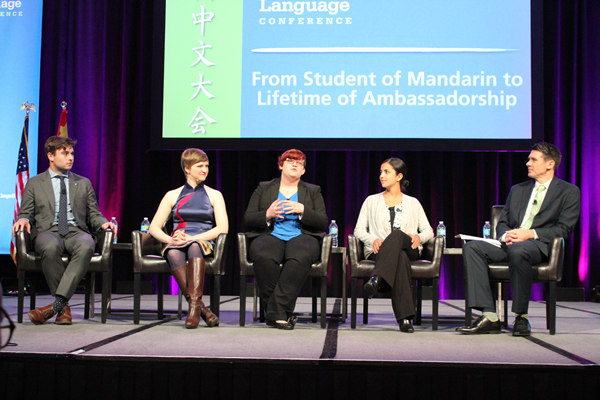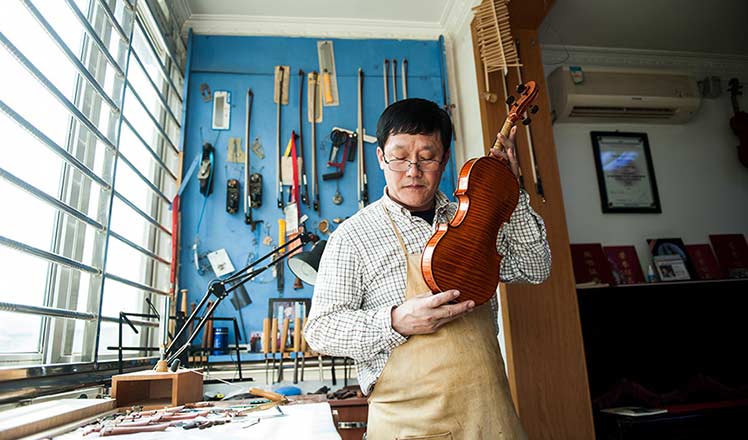Chinese-language study a life-changer: students
Updated: 2016-05-02 05:00
By AMY HE in New York(China Daily USA)
|
||||||||
 |
|
Chinese-language students discuss how they became interested in studying Chinese as a foreign language. The students were attending the 2016 National Chinese Language Conference held in Chicago, on April 30. From left: John Thornton Jr, writer and Schwarzman Scholar; Juliet Petrus, soprano vocalist; Agata Nartowska, a student at Northwestern University; Alyssa Berkowitz, a student at Binghamton University; and Travis Tanner, senior vice-president and chief operating officer of the 100,000 Strong Foundation. AMY HE / CHINA DAILY |
Learning Chinese has changed the life of one student who turned the experience into a recently published novel and another who appeared on a Chinese national TV program with a viewership of 300 million.
Speaking at the 2016 National Chinese Language Conference in Chicago on April 30, John Thornton talked about moving to Beijing for a year as a 14-year-old to train and play with the Beijing Junior International Tennis Team. He ended up writing a debut novel that's loosely based on his experiences.
"At that point in my life, only one of my teammates could speak any English, so I began taking language lessons for a year, and I've been learning Chinese since then," said Thornton, who graduated from Harvard University and soon will be enrolling in the inaugural class for new Schwarzman Scholars at Tsinghua University.
His book Beautiful Country was first published in China in 2013 and was released in the US last week.
Now 25 years old, Thornton said that his classmates were initially skeptical when he told them that he was moving to Beijing during high school — back when only a handful of students were studying Chinese at his school — but that attitude has changed now.
"When I came back from China and talked to my friends about China, it wasn't something that many of them knew very much about," he said.
"Now having put this book out, which was loosely based on my experiences, so many friends who back then thought what I was doing was strange, now a lot of them said the book got them interested in China. It shows you that more and more Americans are becoming interested in China," he said.
Alyssa Berkowitz, a senior at Binghamton University in New York, perhaps is the most famous of the group, having appeared on Chinese Bridge, a popular variety show in China where foreign students compete on their mastery of the Chinese language.
As a child, Berkowitz's father strongly encouraged her and her two sisters to learn Chinese, and she chose the language as an elective course in college.
"My first semester I had a professor who really, really inspired me and encouraged me to learn. For homework assignments we had to write characters 100 times each, and the teacher would go through each character to check. He really encouraged me to study, and since then my life has really flipped upside down," she said, referring to her appearance on Chinese Bridge.
For Agata Nartowska, a senior at Northwestern University, the idea of picking up a language that would allow her to "speak to 1 billion more people was very appealing".
Nartowska is now a student ambassador for the 100,000 Strong Foundation, an initiative that began in 2013 under US President Barack Obama to strengthen US-China relations through Mandarin learning. A goal of the program was to get 100,000 American students to study in China. That goal was met in 2014, and the next plateau is 1 million.
"Initially, Chinese was my language course in high school. I think that can speak to how a simple course — because I was just like, ‘This is a thing, I'll do it' — can really transform your life. I ended up pursuing it all four years, and then in college I ended up taking Chinese history classes, political science classes, everything with regards to China and its history," she said.
"I was finally able to connect the language and the cultural aspect of it really well and say, ‘This is what I want to pursue, this is what I want to do with my life.' It's really great," she said.
Nartowska has studied in China twice and spoken with students at her former high school about the transformative experience of learning Chinese. She encouraged them to do the same.
The oldest Chinese-language learner of the group is Juliet Petrus, a soprano vocalist who picked up Chinese in her 30s as a way to better understand the Chinese songs that she was singing.
"Music scores — especially because I'm a singer, I'm dealing with text — the scores I was receiving have hanzi, and with hanzi you have to break the code. I have many wonderful Chinese colleagues who were willing to read me the pinyin, but ultimately I decided that I really wanted to be able to be self-sufficient. I wanted to be able to read the music and determine the pronunciation," she said.
Petrus was able to study Chinese more in depth through scholarships given by the Confucius Institute that enabled her to go abroad.
She said that her ultimate goal is to bring Chinese music to new audiences, and more specifically, to bring Chinese art songs to Western listeners. Art songs are pieces written usually for one voice with instrumental accompaniment. She released an album last year of Chinese art songs.
"I use that not only to introduce my students and American singers, but also to connect with Chinese students as well" because it's important to connect to the young people over there as well, she said.
- UN urges DPRK to stop 'further provocative action'
- China stresses Putin's expected visit
- British FM visits Cuba for 1st time since 1959
- Trump attacks Clinton on gender, risking backlash from women
- Pirate radio poses surprising challenge in internet age
- DPRK's Musudan missile launch appears to have failed

 Top 10 luxury cars at the 14th Beijing auto show
Top 10 luxury cars at the 14th Beijing auto show
 European castle-style campus wows in Southwest China
European castle-style campus wows in Southwest China
 Industrial city reinvents itself as green oasis
Industrial city reinvents itself as green oasis
 Tiananmen Square decorated as May Day holiday approaches
Tiananmen Square decorated as May Day holiday approaches
 Snapshots of modern-day Chinese at work
Snapshots of modern-day Chinese at work
 Top 10 dazzling new car models at Beijing auto show
Top 10 dazzling new car models at Beijing auto show
 London's Big Ben to fall silent for urgent repairs
London's Big Ben to fall silent for urgent repairs
 Rare snub-nosed monkeys at Beijing Zoo
Rare snub-nosed monkeys at Beijing Zoo
Most Viewed
Editor's Picks

|

|

|

|

|

|
Today's Top News
Liang avoids jail in shooting death
China's finance minister addresses ratings downgrade
Duke alumni visit Chinese Embassy
Marriott unlikely to top Anbang offer for Starwood: Observers
Chinese biopharma debuts on Nasdaq
What ends Jeb Bush's White House hopes
Investigation for Nicolas's campaign
Will US-ASEAN meeting be good for region?
US Weekly

|

|









